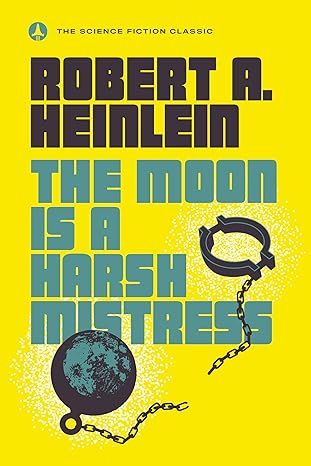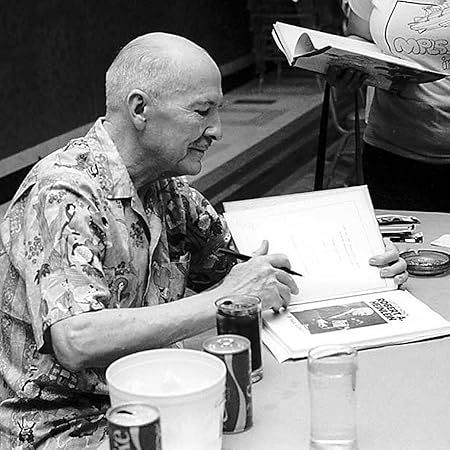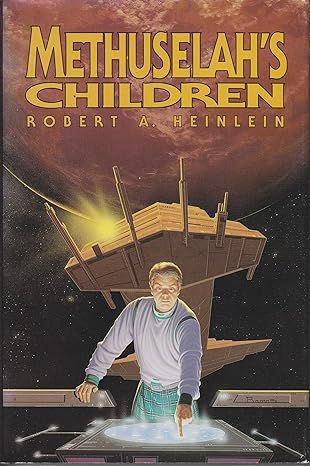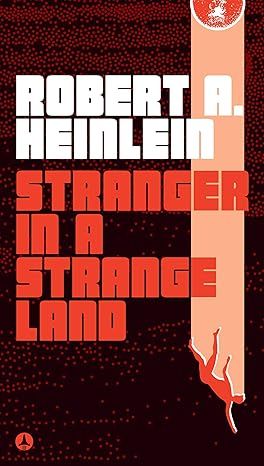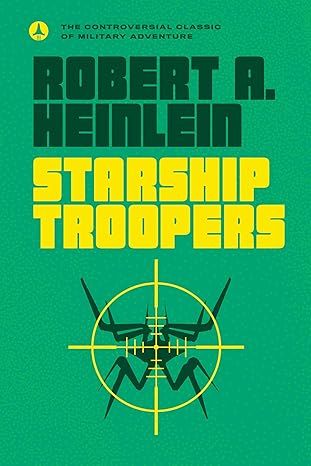The Moon Is a Harsh MistressKindle
4.6
-
8,091 ratings
For fans of Artemis—the visionary tour de force from “one of the grand masters of science fiction” (The Wall Street Journal).
Widely acknowledged as one of Robert A. Heinlein's greatest works, The Moon Is a Harsh Mistress rose from the golden age of science fiction to become an undisputed classic—and a touchstone for the philosophy of personal responsibility and political freedom. A revolution on a lunar penal colony—aided by a self-aware supercomputer—provides the framework for a story of a diverse group of men and women grappling with the ever-changing definitions of humanity, technology, and free will—themes that resonate just as strongly today as they did when the novel was first published.
The Moon Is a Harsh Mistress gives readers an extraordinary, thought-provoking glimpse into the mind of Robert A. Heinlein, who, even now, “shows us where the future is” (Tom Clancy).
Kindle
$9.99
Available instantly
Audiobook
$0.99
with membership trial
Hardcover
$18.35
Paperback
$14.89
Ships from
Amazon.com
Payment
Secure transaction
ISBN-10
0440001358
ISBN-13
978-0440001355
Print length
400 pages
Language
English
Publisher
Ace
Publication date
July 30, 2018
Dimensions
5.41 x 1.02 x 8.18 inches
Item weight
12 ounces
Popular Highlights in this book
Must be a yearning deep in human heart to stop other people from doing as they please. Rules, laws—always for other fellow.
Highlighted by 954 Kindle readers
I wasn’t impressed. As it says in Bible, God fights on side of heaviest artillery.
Highlighted by 392 Kindle readers
My point is that one person is responsible. Always. If H-bombs exist—and they do—some man controls them. In terms of morals there is no such thing as ‘state.’ Just men. Individuals. Each responsible for his own acts.
Highlighted by 330 Kindle readers
Product details
ASIN :
B07CWGBZ4R
File size :
5918 KB
Text-to-speech :
Enabled
Screen reader :
Supported
Enhanced typesetting :
Enabled
X-Ray :
Enabled
Word wise :
Enabled
Editorial reviews
Praise for The Moon is a Harsh Mistress “A significant book in the history of the genre.”—Tor.com “Offers a lot of food for thought and fodder for argument...indisputably rich with ideas.”—io9 “What separates Heinlein’s writing from that of his peers: his ability to show us the inescapable humanity of technologically advanced futures.”—BooksTellYouWhy.com Praise for Robert A. Heinlein and His Novels “We proceed down the path marked by his ideas. He shows us where the future is.”—Tom Clancy “One of the grand masters of science fiction.”—The Wall Street Journal “A brilliant mind-bender...Wonderfully humanizing.”—Kurt Vonnegut “Certainly among the most influential...science fiction novel[s] of all time.”—The Guardian “This book was destined to become a bestseller, shaping the sensibilities of a generation.”—The Boston Globe “The word that comes to mind for him is essential. As a writer—eloquent, impassioned, technically innovating—he reshaped science fiction in a way that defined it for every writer who followed him...He was the most significant science fiction writer since H.G. Wells.”—Robert Silverberg “Heinlein’s genius is at its height in this timeless classic that is meaningful today as when it was written...a fast paced novel that never gets preachy. This is a definite must have, must read book.”—SF Site
From the Back Cover
Winner of the 1967 Hugo award, this novel marked Heinlein's partial return to his best form. He draws many historical parallels with the War of Independence, and clearly shows his own libertarian political views. In what is considered one of his most hair-raising, thought-provoking and outrageous adventures, the master of modern SF tells the strange story of an even stranger world -- 21st century Luna, a harsh penal colony where a revolt is plotted between a bashful computer and a ragtag collection of maverick humans. A revolt that goes beautifully until the inevitable happens. But the problem with the inevitable is that it always happens.
About the Author
Robert Anson Heinlein was born in Missouri in 1907, and was raised there. He graduated from the U.S. Naval Academy in 1929, but was forced by illness to retire from the Navy in 1934. He settled in California and over the next five years held a variety of jobs while doing post-graduate work in mathematics and physics at the University of California. In 1939 he sold his first science fiction story to Astounding magazine and soon devoted himself to the genre.
He was a four-time winner of the Hugo Award for his novels Stranger in a Strange Land (1961), Starship Troopers (1959), Double Star (1956), and The Moon is a Harsh Mistress (1966). His Future History series, incorporating both short stories and novels, was first mapped out in 1941. The series charts the social, political, and technological changes shaping human society from the present through several centuries into the future.
Robert A. Heinlein’s books were among the first works of science fiction to reach bestseller status in both hardcover and paperback. he continued to work into his eighties, and his work never ceased to amaze, to entertain, and to generate controversy. By the time he died, in 1988, it was evident that he was one of the formative talents of science fiction: a writer whose unique vision, unflagging energy, and persistence, over the course of five decades, made a great impact on the American mind.
Read more
Sample
Excerpt. © Reprinted by permission. All rights reserved.
ONE
That Dinkum Thinkum
I see in Lunaya Pravdathat Luna City Council has passed on first reading a bill to examine, license, inspect--and tax--public food vendors operating inside municipal pressure. I see also is to be mass meeting tonight to organize “Sons of Revolution” talk-talk.
My old man taught me two things: “Mind own business” and “Always cut cards.” Politics never tempted me. But on Monday 13 May 2075 I was in computer room of Lunar Authority Complex, visiting with computer boss Mike while other machines whispered among themselves. Mike was not official name; I had nicknamed him for Mycroft Holmes, in a story written by Dr. Watson before he founded IBM. This story character would just sit and think--and that’s what Mike did. Mike was a fair dinkum thinkum, sharpest computer you’ll ever meet.
Not fastest. At Bell Labs, Bueno Aires, down Earthside, they’ve got a thinkum a tenth his size which can answer almost before you ask. But matters whether you get answer in microsecond rather than millisecond as long as correct?
Not that Mike would necessarily give right answer; he wasn’t completely honest.
When Mike was installed in Luna, he was pure thinkum, a flexible logic--”High-Optional, Logical, Multi-Evaluating Supervisor, Mark IV, Mod. L”--a HOLMES FOUR. He computed ballistics for pilotless freighters and controlled their catapult. This kept him busy less than one percent of time and Luna Authority never believed in idle hands. They kept hooking hardware into him--decision-action boxes to let him boss other computers, bank on bank of additional memories, more banks of associational neural nets, another tubful of twelve-digit random numbers, a greatly augmented temporary memory. Human brain has around ten-to-the-tenth neurons. By third year Mike had better than one and a half times that number of neuristors.
And woke up.
Am not going to argue whether a machine can “really” be alive, “really” be self-aware. Is a virus self-aware? Nyet. How about oyster? I doubt it. A cat? Almost certainly. A human? Don’t know about you, tovarishch, but Iam. Somewhere along evolutionary chain from macromolecule to human brain self-awareness crept in. Psychologists assert it happens automatically whenever a brain acquires certain very high number of associational paths. Can’t see it matters whether paths are protein or platinum.
(“Soul?” Does a dog have a soul? How about cockroach?)
Remember Mike was designed, even before augmented, to answer questions tentatively on insufficient data like you do; that’s “high-optional” and “multi-evaluating” part of name. So Mike started with “free will” and acquired more as he was added to and as he learned--and don’t ask me to define “free will.” If comforts you to think of Mike as simply tossing random numbers in air and switching circuits to match, please do.
By then Mike had voder-vocoder circuits supplementing his read-outs, print-outs, and decision-action boxes, and could understand not only classic programming but also Loglan and English, and could accept other languages and was doing technical translating--and reading endlessly. But in giving him instructions was safer to use Loglan. If you spoke English, results might be whimsical; multi-valued nature of English gave option circuits too much leeway.
And Mike took on endless new jobs. In May 2075, besides controlling robot traffic and catapult and giving ballistic advice and/or control for manned ships, Mike controlled phone system for all Luna, same for Luna-Terra voice & video, handled air, water, temperature, humidity, and sewage for Luna City, Novy Leningrad, and several smaller warrens (not Hong Kong in Luna), did accounting and payrolls for Luna Authority, and, by lease, same for many firms and banks.
Some logics get nervous breakdowns. Overloaded phone system behaves like frightened child. Mike did not have upsets, acquired sense of humor instead. Low one. If he were a man, you wouldn’t dare stoop over. His idea of thigh-slapper would be to dump you out of bed--or put itch powder in pressure suit.
Not being equipped for that, Mike indulged in phony answers with skewed logic, or pranks like issuing pay cheque to a janitor in Authority’s Luna City office for AS-$10,000,000,000,000,185.15--last five digits being correct amount. Just a great big overgrown lovable kid who ought to be kicked.
He did that first week in May and I had to troubleshoot. I was a private contractor, not on Authority’s payroll. You see--or perhaps not; times have changed. Back in bad old days many a con served his time, then went on working for Authority in same job, happy to draw wages. But I was born free.
Makes difference. My one grandfather was shipped up from Joburg for armed violence and no work permit, other got transported for subversive activity after Wet Firecracker War. Maternal grandmother claimed she came up in bride ship--but I’ve seen records; she was Peace Corps enrollee (involuntary), which means what you think: juvenile delinquency female type. As she was in early clan marriage (Stone Gang) and shared six husbands with another woman, identity of maternal grandfather open to question. But was often so and I’m content with grandpappy she picked. Other grandmother was Tatar, born near Samarkand, sentenced to “re-education” on Oktyabrskaya Revolyutsiya, then “volunteered” to colonize in Luna.
My old man claimed we had even longer distinguished line--ancestress hanged in Salem for witchcraft, a g’g’g’great-grandfather broken on wheel for piracy, another ancestress in first shipload to Botany Bay.
Proud of my ancestry and while I did business with Warden, would never go on his payroll. Perhaps distinction seems trivial since I was Mike’s valet from day he was unpacked. But mattered to me. I could down tools and tell them go to hell.
Besides, private contractor paid more than civil service rating with Authority. Computermen scarce. How many Loonies could go Earthside and stay out of hospital long enough for computer school?--even if didn’t die.
I’ll name one. Me. Had been down twice, once three months, once four, and got schooling. But meant harsh training, exercising in centrifuge, wearing weights even in bed--then I took no chances on Terra, never hurried, never climbed stairs, nothing that could strain heart. Women--didn’t even thinkabout women; in that gravitational field it was no effort not to.
But most Loonies never tried to leave The Rock--too risky for any bloke who’d been in Luna more than weeks. Computermen sent up to install Mike were on short-term bonus contracts--get job done fast before irreversible physiological change marooned them four hundred thousand kilometers from home.
But despite two training tours I was not gung-ho computermen; higher maths are beyond me. Not really electronics engineer, nor physicist. May not have been best micromachinist in Luna and certainly wasn’t cybernetics psychologist.
But I knew more about all these than a specialist knows--I’m general specialist. Could relieve a cook and keep orders coming or field-repair your suit and get you back to airlock still breathing. Machines like me and I have something specialists don’t have: my left arm.
You see, from elbow down I don’t have one. So I have a dozen left arms, each specialized, plus one that feels and looks like flesh. With proper left arm (number-three) and stereo loupe spectacles I could make untramicrominiature repairs that would save unhooking something and sending it Earthside to factory--for number-three has micromanipulators as fine as those used by neurosurgeons.
So they sent for me to find out why Mike wanted to give away ten million billion Authority Scrip dollars, and fix it before Mike overpaid somebody a mere ten thousand.
I took it, time plus bonus, but did not go to circuitry where fault logically should be. Once inside and door locked I put down tools and sat down. “Hi, Mike.”
He winked lights at me. “Hello, Man.”
“What do you know?”
He hesitated. I know--machines don’t hesitate. But remember, Mike was designed to operate on incomplete data. Lately he had reprogrammed himself to put emphasis on words; his hesitations were dramatic. Maybe he spent pauses stirring random numbers to see how they matched his memories.
“’In the beginning,‘” Mike intoned, “’God created the heaven and the earth. And the earth was without form, and void; and darkness wasupon the face of the deep. And--’”
“Hold it!” I said. “Cancel. Run everything back to zero.” Should have known better than to ask wide-open question. He might read out entire Encyclopaedia Britannica. Backwards. Then go on with every book in Luna. Used to be he could read only microfilm, but late ‘74 he got a new scanning camera with suction-cup waldoes to handle paper and then he read everything.
“You asked what I knew.” His binary read-out lights rippled back and forth--a chuckle. Mike could laugh with voder, a horrible sound, but reserved that for something really funny, say a cosmic calamity.
“Should have said,“ I went on, “’What do you know that’s new?’ But don’t read out today’s papers; that was a friendly greeting, plus invitation to tell me anything you think would interest me. Otherwise null program.”
Mike mulled this. He was weirdest mixture of unsophisticated baby and wise old man. No instincts (well, don’t thinkhe could have had), no inborn traits, no human rearing, no experience in human sense--and more stored data than a platoon of geniuses.
“Jokes?” he asked.
Read more
About the authors
Robert Heinlein
Robert Heinlein was an American novelist and the grand master of science fiction in the twentieth century. Often called 'the dean of science fiction writers', he is one of the most popular, influential and controversial authors of 'hard science fiction'.
Over the course of his long career he won numerous awards and wrote 32 novels, 59 short stories and 16 collections, many of which have cemented their place in history as science fiction classics, including STARSHIP TROOPERS, THE MOON IS A HARSH MISTRESS and the beloved STRANGER IN A STRANGE LAND.
Read more
Reviews
Customer reviews
4.6 out of 5
8,091 global ratings
Chris Jiongo
5
Interesting story
Reviewed in the United States on July 27, 2024
Verified Purchase
This book was referred to me by a fellow sci-fi fan and I have to admit, it was worth the time and effort. The plot is something that is very believable and could happen in the near future once the moon is colonized. The [acing and character development were very good I thought, and it's just an enjoyable read if you like sci-fi and contemplating what could be occurring in the near future, even if not all of it is good.
Read more
Todd O'Rourke
5
A "Classic" That Is Worthy Of Being Read
Reviewed in the United States on December 5, 2012
Verified Purchase
I often scour the forums in search of my next science fiction book to read. On more than one occasion, I have been presented with "The Moon is a Harsh Mistress" as one of the greatest science fiction novels in history. The only reservations I have when dealing with novels considered "classics" are their readability. I have frequently read novels considered classics and they are disappointing and outdated. I can say in all honesty, "The Moon is a Harsh Mistress" is undoubtedly a classic that holds up well.
It is a tale of revolution, of the rebellion of a former penal colony on the Moon against its masters on the Earth. It is a tale of a culture whose family structures are based on the presence of two men for every woman, leading to novel forms of marriage and family. It is the story of the disparate people--a computer technician, a vigorous young female agitator, and an elderly academic--who become the movement's leaders, and of Mike, the supercomputer whose sentience is known only to the revolt's inner circle, who for reasons of his own is committed to the revolution's ultimate success.
One thing I noticed right away was the way the Loonies use language differently than people from earth do. In fact, it threw me at first -- I couldn't figure out what was going on or why the language was so rough and unpolished and choppy. Eventually, though, I found the rhythm of it and settled in just fine -- I didn't even notice it after a while. It makes sense; Luna started off as a penal colony and has since developed completely seperate from Earth and relatively unmolested. Of course they would have their own dialect and speech patterns! To my mind, their language seems to be as efficent as possible. They trimmed away any unnecessary deadwood -- they don't use articles, for example, and very few personal pronouns, and they seem to prefer to use fragments to complete sentences. Only the essentials remain, much the same as the original colonists/prisoners had to start their lives over with only the bare essentials and sometimes not even that.
This book was written about forty years ago, and it has stood the test of time quite well, but there are some aspects of it that do seem rather dated. For example, the idea behind the character of Mike -- the computer that is connected to everything and has "woken up" or become alive -- is one that is very familiar to modern readers, one that we accept easily. Apparently, we accept it much more easily than Heinlen expected his readers in 1965 to accept it, because he spends more time explaining it than he really needs to. When Mannie, the narrator, tells Wyoh about Mike and introduces them via a telephone conversation, she is shocked that Mike already knows what she looks like. He looked up her medical records and found a picture of her immediately after being introduced to her. To modern readers familiar with the internet, this is an obvious step and hardly shocking; we expect it, and Wyoh's shock and apparent need to have every detail and implication of Mike's "life" spelled out for her makes her seem a little bit stupid to us. If we don't remember that Heinlen is using Wyoh to explain things to his 1965 audience that his 2005 audience intuitively understands, then we'll get a little frustrated with Wyoh's denseness.
All in all, this is a novel about politics -- a very complex, deep, intellectual and sophisticated look at politics, government, revolution and war. The Moon is a Harsh Mistress has a very definite world-view and political philosophy, some of which I agreed with, and some of which I really, really didn't. My agreement (or lack thereof) with the politics espoused in this book didn't seem to have much bearing on my enjoyment of it. This is a book that requires the reader to think. And that, I think, is why I loved it so much.
5 Stars
Read more
32 people found this helpful
Linda S.
5
A classic.
Reviewed in the United States on August 14, 2024
Verified Purchase
Great premise, particularly for the era it was written. The Interpersonal relationships seem pretty idealistic but it really points out why we are all now racing to establish bases on the moon.
BK
5
This one goes to eleven
Reviewed in the United States on September 21, 2024
Verified Purchase
Quite possibly the best book Heinlein ever wrote. Take one disinterested computer tech, one self aware computer, add a dash of anarchy, and stir well.
2 people found this helpful
Richard E. Berger
5
Reread after many years
Reviewed in the United States on July 26, 2024
Verified Purchase
Still a great book, much to ponder and consider. Also a great story relevant to today’s infatuation with AI. And a great tale of freedom and throwing off the yoke of tyranny, also relevant today.
2 people found this helpful
Top Robert Heinlein titles
View allBest Sellers
View all
The Tuscan Child
4.2
-
100,022
$8.39

The Thursday Murder Club: A Novel (A Thursday Murder Club Mystery)
4.3
-
155,575
$6.33

Sapiens: A Brief History of Humankind
4.6
-
140,302
$13.49

The Butterfly Garden (The Collector, 1)
4.3
-
88,556
$9.59

Things We Hide from the Light (Knockemout Series, 2)
4.4
-
94,890
$11.66

The Last Thing He Told Me: A Novel
4.3
-
154,085
$2.99

The Perfect Marriage: A Completely Gripping Psychological Suspense
4.3
-
143,196
$9.47

The Coworker
4.1
-
80,003
$13.48

First Lie Wins: A Novel (Random House Large Print)
4.3
-
54,062
$14.99

Mile High (Windy City Series Book 1)
4.4
-
59,745
$16.19

Layla
4.2
-
107,613
$8.99

The Locked Door
4.4
-
94,673
$8.53
